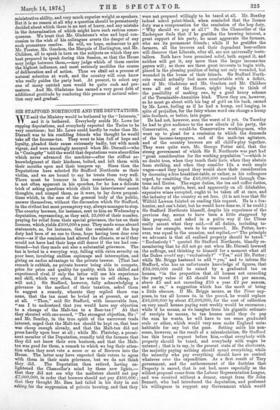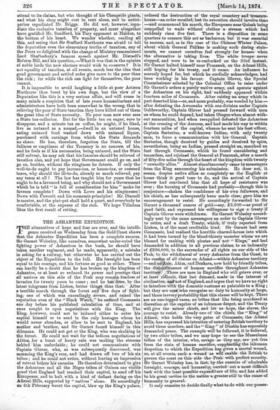SM STAFFORD NORTHCOTE AND THE DEPUTATIONS.
WE said the Ministry would be bothered by the "Interests," and it is bothered. Everybody scolds Mr. Lowe for rapping deputations, and everybody expected the Tories to be very courteous; but Mr. Lowe could hardly be ruder than Mr. Disraeli was to his confiding friends who thought he would take off the Income-tax. They went to him full of hope and loyalty, pleaded their cause extremely badly, but with much 'vigour, and were amusingly annoyed when Mr. Disraeli—who in "Coningsby " told the world that deputations were absurdities which never advanced the machine—after the stiffest ac- knowledgment of their kindness, bolted, and left them with their mouths open and their tempers up. Since then the Deputations have selected Sir Stafford Northcote as their victim, and we are bound to say he treats them very well. There must be humour in him somewhere, though it is not often apparent in his speeches, for he has a delicate trick of asking questions which elicit his interviewers' secret thoughts, and compel them, as it were, to lay down proposi- tions which, in the ears of the general body of the public, answer themselves, without the discussion which Sir Stafford, in the civilest but most peremptory way, always manages to stop. The country brewers, for instance, sent to him on Wednesday a deputation, representing, as they said, 33,000 of their number, praying for relief from their special grievance, the tax on their licences, which yields £400,000 a year. They made some absurd statements, as, for instance, that the remission of the hop duty had been of no use to them, hops having been dear ever since—as if the remission had altered the climate, or as if they would not have had their hops still dearer if the tax had con- tinued—but they made out also a substantial grievance. The tax is levied in a worrying way, falling with extra severity on poor beer, involving endless espionage and interruption, and giving an undue advantage to the private brewer. (That last remark is rubbish, no private brewer being able to compete, price for price and quality for quality, with his skilled and experienced rival, if only the latter will use his experience and skill, which very often, if he wants to sell cheap, he will not.) Sir Stafford, however, fully acknowledging a grievance in the method of their taxation, asked them to suggest a remedy, whereto they replied there was none, that the tax must be levied as at present, or not at all. "Then," said Sir Stafford, with immovable face, "am I to understand that you would have any objection to a change of the Malt-tax to a Beer-tax ?" At that they shouted with one accord, "The strongest objection, Sir ;" and Mr. Bentley, in the true spirit of the narrowest trade interest, urged that the Malt-tax should be kept on, that beer was cheap enough already, and that the Malt-tax did not press hardly upon beer at all ; while Mr. Flatteley, a promi- nent member of the Deputation, roundly told the farmers that they did not know their own business, and that the Malt- tax was good for them, a remark to which we beg their atten- tion when they next vote a score or so of Brewers into the House. The latter may have expected their voters to agree with them in their main grievance, but we do not think they did. The Deputation then retired, having en- lightened the Chancellor's mind by these new lights,— that they did not see why the maltsters should not pay £7,000,000, in order that brewers should not pay £400,000; that they thought Mr. Bass had failed in his duty in not asking for the suppression of private brewing, and that they ministrative ability, and very much superior weight as speakers. 'were not prepared willingly to be taxed at all. Mr. Bentley indeed asked point-blank, when reminded that the licence duty was a compensation for the remission of the hop duty, "Why should we pay at all I" So the Chancellor of the Exchequer finds that if he gratifies the brewing interest, a great support of his party, he must aggravate the farmers, who are its permanent friends ; while if he gratifies the farmers, all the brewers and their dependent beer-sellers will discover that Liberals, after all, are not universally teeto- tallers. Both have been promised relief, both expect it, and neither will get it, any more than the larger income-tax payers will ; so there are three great interests to begin with, placed in the pleasing position of being not only wounded, but wounded in the house of their friends. Sir Stafford North- cote would actually feel more comfortable with a deficit, and if Mr. Gladstone and Mr. Goschen and Mr. Childers were all out of the House, might begin to think of the possibility of making one, by a good heavy scheme of the Terminable-Annuities kind. There they are, however, so he must go about with his bag of gold on his back, earned by Mr. Lowe, feeling as if he had a hump, and longing, in spite of prejudice, for the fairy whose word can change a hump into feathers, or better, into paper.
He had not, however, seen the worst of it yet. On Tuesday he had to give audience to the new clients of his party, the Conservative, or would-be Conservative working-men, who went up to plead for a remission to which the demands of the income-taxpayers, and of the malt-tax agitators, and of the country brewers are all child's-play together. They were quite sure, Mr. George Potter said, that the strong government of which Sir S. Northcote was part had "great consideration for the working population "—which is no doubt true, when they touch their hats, when they abstain from striking, and when they consider 12s. a week ample wages—and they hoped they would show their consideration by decreeing a free breakfast-table, or rather, as his colleagues urged, by remitting the £46,000,000 received through Cus- toms and Excise. The sugar duties, the tea and coffee duties, the duties on spirits, beer, and apparently on all drinkables, expensive wines excepted, ought to be taken off at once, and the industry of the country so set free. (It is not true that Sir Wilfrid Lawson fainted on reading this request. He is a fox- hunter, and can't faint, but he would have done so, if he could.) Sir Stafford Northcote himself, despite his experience of the previous day, seems to have been a little staggered by this proposal, and asked in a polite way if the Ultras really meant what they said,—if all duties, including to- bacco for example, were to be removed. Mr. Potter, how- ever, was equal to the occasion, and replied,—" The principle we advocate is that all realised property should be taxed." " Exclusively ? " queried Sir Stafford Northcote, blandly re- membering that he did not go out when Mr. Disraeli lowered the suffrage, and thinking to himself for a moment what all the Dukes would say; ‘-‘exclusively ?" "Yes," said Mr. Potter; while Mr. Briggs hastened to add "yes," and to inform Sir Stafford, who has an unfortunate knowledge of figures, that £34,000,000 could be raised by a graduated tax on houses, "in the proportion that all houses not exceeding the yearly value of £5 should be taxed £1 per annum, above £5 and not exceeding £10 a year £2 per annum, and so on," a suggestion which has the merit of being a little obscure. If Mr. Briggs means, as the Times sup- poses, to tax all houses 4s. in the pound, he would replace £46,000,000 by about £7,000,000, for the cost of collection on very small houses paying rent weekly would be enormous ; while if he means, as we imagine from his gigantic estimate of receipts he means, to tax houses until they do pay the sum he wants, he will have to use some graduated scale or other, which would very soon make England unin- habitable for any but the poor. Setting aside his non- sense, however, as the result of a miscalculation, Sir Stafford has this broad request before him,—that everybody with property should be taxed, and everybody with wages be untaxed ; that is to say, in the present state of the electorate, the majority paying nothing should spend everything, while the minority who pay everything should have no control whatever over the expenditure. As a first result of Tory government, and the enthronement of the doctrine that Property is sacred, that is not bad, more especially as the wildest proposal came from the Labour Representation League, and was received without a demur, except from Sir John Bennett, who had introduced the deputation, and professed his willingness to support any Government which would attend to its claims, but who thought of his Cheapside giants, mid what his shop might cost in rent alone, and in antici- pation repudiated Mr. Briggs. He did not, however, repu- diate the exclusive taxation of property, and must altogether have gratified Mr. Sandford, his Tory opponent at Maldon, to the bottom of his heart. We wonder whether, reading all this, and seeing that Sir Stafford Northcote was afraid to tell the deputation even the elementary truths of taxation, any of the Peers so delighted with the change of Ministry remembered Lord Shaftesbury's famous speech against Mr. Diaraeli's Reform Bill, and his question,—What it was that in the opinion of noble lords the new electors would wish to conserve? It is not equality of taxation, at all events, much less the idea that good government and settled order give more to the poor than the rich'; for while the rich can fight for themselves, the poor cannot.
It is impossible to avoid laughing a little at poor Acton Northcote thus beset by his own dogs, but the view of a Deputation like this is a very serious affair, and will rouse in many minds a suspicion that of late years humanitarians and administrators have both been somewhat in the wrong, that in relieving the poor of State taxation they have killed out of them the great idea of State necessity. No poor man now ever sees a State tax-collector. But for the little tax on sugar, sure to disappear, and a minute tax on coffee, he might, if he liked, live as untaxed as a nomad,—dwell in an untaxed house, eating untaxed food washed down with untaxed liquor, purchased with earnings from which the State demands no share. He has, therefore, forgotten the State, till the fullness or emptiness of the Treasury is no concern of his, and he feels as if his necessaries, being untaxed, and the State still solvent, he may ask that his luxuries should be relieved of taxation also, and yet hope that Government could go on, and go on, besides, without the stinginess he detests. If only the well-to-do ought to pay income-tax, or house-tax, or assessed taxes, why should the ill-to-do, already so much relieved, pay any taxes at all ? The law has taught him for years that he ought to be a favoured being, and why should not a Government which he is told "is full of consideration for him" make its favours complete ? Down with Lowe and his stinginessesl Down with Fawcett and his economic principles! Mr. Disraeli is master, and the pint-pot shall hold a quart, and everybody be comfortable, at the expense of the rich. We hope Villadom likes the first result of ratting.

































 Previous page
Previous page